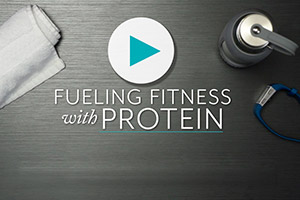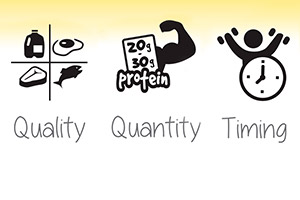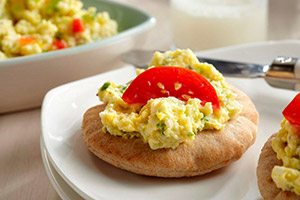Physical Performance
Nutrition is an important aspect in athletic performance. Download these shareable videos, graphics, handouts and recipes to help promote the power of protein and eggs.
Whole Eggs Uniquely Support Muscle Health

Featured article in the Spring 2019 Issue of Nutrition Close-Up; written by Marie Spano, MS, RD, CSCS, CSSD
Healthy strong muscles are important throughout the lifespan. Resistance training and sufficient dietary protein help support muscle maintenance and strength. Research has shown the importance of both the total amount of protein consumed each day as well as the amount of protein per meal. However, emerging research is showing other factors within food, besides protein, influence the synthesis of new proteins in muscle.
Over the past several years, scientists have examined how amino acids and isolated sources of protein impact muscle protein synthesis. This research serves as a foundation to better examine aspects beyond protein. Leucine, an essential amino acid, turns on the machinery driving the synthesis of new proteins in muscle. While leucine is the switch turning this process on, all essential amino acids are necessary to provide the building blocks for muscle protein synthesis to be running optimally. Quality sources of protein including whey, egg, soy and beef contain all essential amino acids in appreciable quantities to support this process. Yet studies comparing protein-rich drinks and whole foods have led to results that cannot be explained by differences in leucine or the amount of high quality protein consumed.
Why Eggs Are The Perfect Recovery Food

By Natalie Rizzo, MS, RD
The Egg Nutrition Center partnered with Natalie Rizzo, MS, RD to write this blog post.
Eggs have a unique nutrition profile that is great for athletes of all ages. While they make a nice addition to any meal of the day, the nutrients in eggs can help with recovery after exercise. Just as stretching and cooling down is important after a workout, recovery nutrition is vital for repairing worn down muscle and revitalizing energy stores. But its not just the protein in eggs that make them a recovery food. Lets take a look at the plethora of nutrients in eggs that help refuel a healthy athlete.
Protein: Research indicates that eating 20-30 grams of protein from foods that include leucine, such as eggs, may promote muscle repair after exercise1. One large egg contains 6 grams of high-quality protein with all nine essential amino acids. The International Society of Sports Nutrition recommends athletes focus on whole food sources of protein that contain all of the essential amino acids to aid in muscle protein synthesis2.
Vitamin D: This micronutrient is critical for bone health, and research suggests that adequate vitamin D intake reduces the risk of stress fracture, total body inflammation, illness, and impaired muscle function3. Unfortunately, adequate vitamin D intake is difficult to achieve due to variations in skin color, the time spent outdoors and geographic location. Eggs are one of the only natural food sources of vitamin D, with one large egg containing 6% of the daily value.
Lutein: This antioxidant has been known to accumulate in the eye, and scientists have recently discovered that its also present in the brain. Lutein in the eye may help athletes with visual performance and protecting the retina from damaging light4. Plus, new research in children suggests that lutein could have cognitive boosting capabilities and may even improve academic performance5. Luckily, lutein bioavailability is enhanced when it is consumed with dietary fat, making lutein from eggs a more absorbable source of lutein than many other foods6.
Other Benefits
Besides the impressive nutrient profile, eggs also have other practical applications for recovery, such as:
- Eggs are affordable. One egg only costs about 15?, which is quite the nutritional bang for your buck.
- They are quick to cook. You can cook up an egg in less than 10 minutes, which will quickly satisfy a rumbling tummy and tired muscles after a tough workout.
- Eggs go with practically anything. You can put an egg on almost anything pizza, pasta, grains, bread, oatmeal, veggies and more!
References
- Mamerow, M., Mettler, J., English, K., Casperson, S., Arentson-Lantz, E., & Sheffield-Moore, M. et al. (2014). Dietary Protein Distribution Positively Influences 24-h Muscle Protein Synthesis in Healthy Adults. The Journal Of Nutrition, 144(6), 876-880. doi: 10.3945/jn.113.185280
- Campbell, B., Kreider, R., Ziegenfuss, T., La Bounty, P., Roberts, M., & Burke, D. et al. (2007). International Society of Sports Nutrition position stand: protein and exercise. Journal Of The International Society Of Sports Nutrition, 4(1), 8. doi: 10.1186/1550-2783-4-8
- Larson-Meyer, D., & Willis, K. (2010). Vitamin D and Athletes. Current Sports Medicine Reports, 9(4), 220-226. doi: 10.1249/jsr.0b013e3181e7dd45
- Hammond, B., & Fletcher, L. (2012). Influence of the dietary carotenoids lutein and zeaxanthin on visual performance: application to baseball. The American Journal Of Clinical Nutrition, 96(5), 1207S-1213S. doi: 10.3945/ajcn.112.034876
- Barnett, S., Khan, N., Walk, A., Raine, L., Moulton, C., & Cohen, N. et al. (2017). Macular pigment optical density is positively associated with academic performance among preadolescent children. Nutritional Neuroscience, 21(9), 632-640. doi: 10.1080/1028415x.2017.1329976
- Chung, H., Rasmussen, H., & Johnson, E. (2004). Lutein Bioavailability Is Higher from Lutein-Enriched Eggs than from Supplements and Spinach in Men. The Journal Of Nutrition, 134(8), 1887-1893. doi: 10.1093/jn/134.8.1887
Eat your Eggs After: A Recovery Food for Athletes
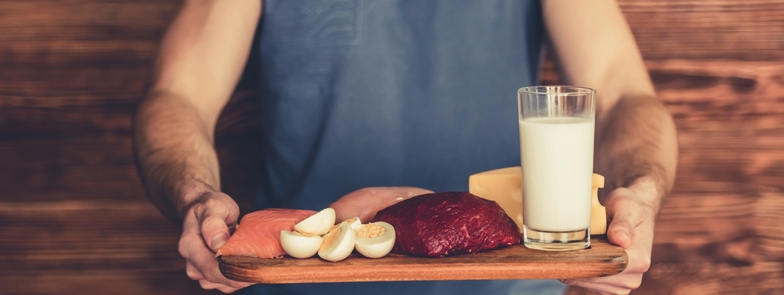
Featured article in the Winter 2018 Issue of Nutrition Close-Up; written by Kristen Arnold, RDN, LD, MS
Optimal recovery protocols for athletes are critical to physical performance. Athletes and coaches often ask: What should an athlete eat after a workout? How much protein does an athlete need aft er a workout? What are easy and affordable options for post-workout recovery nutrition?
Maintain Your Fitness Routine While Traveling for the Holidays

Its no surprise that your normal fitness routine can take a hit while traveling for the holidays. But the following FIVE tips include some surprisingly simple ways to get your sweat on even in the face of a demanding holiday travel schedule.
Whole Eggs for Muscle Growth
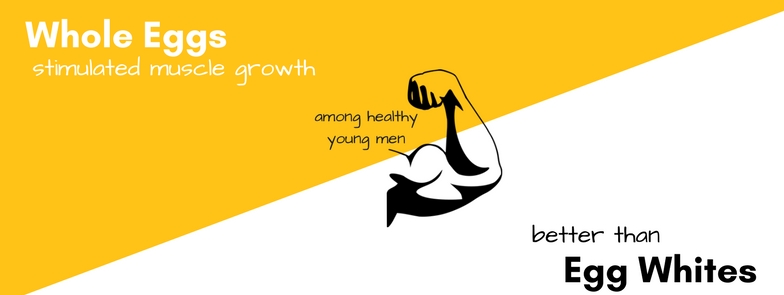
In nutrition science, individual nutrients are often recognized for their specific roles in physiology. We know that calcium is critical for bone health, choline is important for brain development and a lack of vitamin C will result in scurvy. However, whole foods are complex and contain numerous compounds, often leading to effects that extend beyond the sum of their parts.

